Sala de prensa
Sala de prensa
- Home
- Page

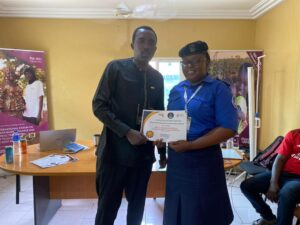
After 3 months of data collection nationwide in collaboration with GIZ on assessing Gambia Police Officers on Sexual and Gender Based Violence, Wassu Gambia Kafo, handed over certificates of participation to all the data collectors. 28/08/2024
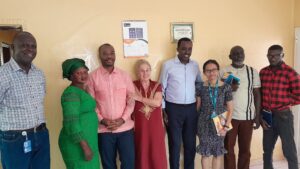
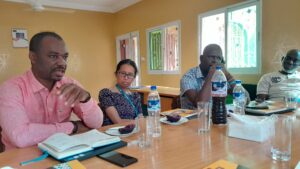
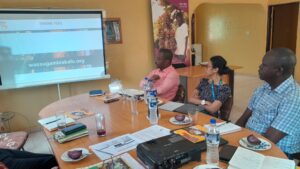
A courtesy visit by UNICEF Team, followed by an impressive presentation on FGM and other related issues that affect the Health of women. The session was very interesting as we shared different thoughts on the new approaches and techniques that will usher us to the route of ending FGM as we hope for a future collaboration. 09/05/2024
NAM says no rhetoric will frustrate efforts to repeal FGM law
NAM says no rhetoric will frustrate efforts to repeal FGM Law
The National Assembly Member for Fôni Kansala, Almameh Gibba, has vowed to continue the fight to ensure the law banning female genital mutilation is decriminalized. In February, Mr. Gibba introduced the Women’s Amendment Bill 2024, intended to decriminalize FGM. The bill has passed a second reading and is currently under consultation before its third and final reading.
The National Assembly passed the anti-FGM law in 2015, a month after former president Yahya Jammeh announced banning it, with up to three years imprisonment as a penalty.
However, there have been growing calls for the law to be scrapped, with prominent Islamic leader Abdoulie Fatty leading the crusade. On Tuesday, The Standard published a statement from the Independent Permanent Human Rights Commission of the Organization of Islamic Cooperation expressing its overwhelming support for the elimination of female genital mutilation (FGM).
Reacting to The Standard publication, Gibba said: “It is unfortunate that people who portray themselves as Muslims and Christians are influenced by the West to frustrate practices that are recommended by religion and culture.”
He said as the custodian of the bill, he will continue to do everything humanly possible to ensure that the law is repealed. Gibba urged Gambian activists to stop portraying female circumcision as female genital mutilation. “The bill I tabled at the National Assembly is seeking to decriminalize female circumcision and not FGM because FGM is not practiced in The Gambia. I will continue to mobilize efforts and support from all and sundry who respect our religious laws and cultural beliefs,” he said.
Gibba added that women and human rights activists should focus on addressing issues such as maternal mortality which is rising in The Gambia.
“Just last year, we lost 52 women while giving birth, and none of these cases is associated with FGM. What is stopping our activists from talking about things? Why do they just focus on FGM? Can’t we put pressure on the government to address the issues in our health sector that are killing our women during birth?” Gibba noted.He said female circumcision is accepted in many countries that have realized its benefits.“We are calling on all Gambians to rally together and ensure that the law is decriminalized. Even Gambian doctors are saying there is no harm in female circumcision,” he added.
The NAM argued that the West should stop interfering with the country’s internal affairs, especially those that have to do with culture and religion.
“The majority of Gambians are practicing female circumcision, and I want to assure Gambians that I am more committed now than before to making sure the law is repealed. My conviction is that our laws should be considerate of the religious and cultural needs of our people,” he said. 09/05/2024

A courtesy visit by Alfred Hill from International Development Law to know more about the work that has been done by Wassu Gambia Kafo over the years on FGM and other SGBV and hope for a future collaboration.
OIC SUPPORTS ELIMINATION OF FGM
The Organisation of Islamic Cooperation (OIC) has expressed its overwhelming support for the elimination of all harmful practices including female genital mutilation (FGM) that threaten the physical and psychological health of women and girls in accordance with the international human rights standards.
In a statement marking ‘International Day of Zero Tolerance for Female Genital Mutilation 2024’, the Independent Permanent Human Rights Commission (IPHRC) of the Organization of Islamic Cooperation expressed support for the efforts and initiatives aimed at eliminating all forms of harmful practices, including FGM, “that has the potential to threaten physical, psychological and mental well-being of women and girls under all circumstances”.
“The Commission considers that harmful practices like FGM are mere traditional customs without any proven religious sanction. On the contrary, the Islamic principles and values categorically condemn such practices and strongly advocates adopting legal and administrative measures to comprehensively eliminate these practices not only as a religious imperative but also for achieving equality, equity, social justice, and sustainable development,” it added.
The OIC human rights commission further said it welcomes the rising awareness across the Muslim world against the practice that “endangers the physical and psychological health of women and girls”.
“It was concluded at the Second Islamic Conference of Ministers in charge of Childhood held in Khartoum in 2009 that FGM is a violation of human rights of girls and women. OIC has adopted ‘Cairo Declaration of the OIC on Human Rights in which specific sections are included on ‘Human Rights of Women’, which calls for protection of women against all forms of discrimination, violence, abuse and harmful traditional practices,” the IPHRC added.
The Commission also commended the progress made by governments and communities that have taken steps to abandon harmful practices, emphasizing that much work remains to be done to fully eradicate such harmful practices.
“The Commission remains committed to supporting initiatives that empower communities to abandon FGM and create an environment where girls and women can thrive without fear of this harmful tradition. It calls on governments, civil society, religious leaders, and communities to redouble their efforts in raising awareness, providing education, and implementing legal measures to end all harmful practices, including FGM,” it stated.
The Commission also affirmed its readiness to work together with all relevant OIC institutions and member states, respecting cultural sensitivities, while promoting education on the health and human rights consequences of such practices. 07/05/2024


Training Police officers at GIZ office (06/05/2024

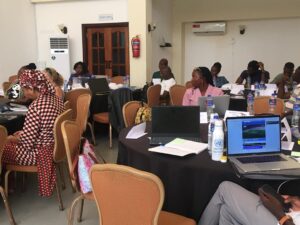

As The Gambia National Assembly
Gender /Health Committee is set to review the Women’s Amendment Act 2024. CSO coalition during the weekend at Tropic Gardens had two days retreat to draft a position paper to be presented to the National Assembly Members in order NOT to repeal the law banning FGM/C. Sessions presented by Wassu Gambia Kafo showing evidences based on scientific and clinical results will be the backbone of the document. CSO where able to compile material evidence and establish position papers and policy brief documents which will be presented to National Assembly Gender /Health Committee.
As The Gambia National Assembly
Gender /Health Committee is set to review the Women’s Amendment Act 2024. CSO coalition during the weekend at Tropic Gardens had two days retreat to draft a position paper to be presented to the National Assembly Members in order NOT to repeal the law banning FGM/C. Sessions presented by Wassu Gambia Kafo showing evidences based on scientific and clinical results will be the backbone of the document. CSO where able to compile material evidence and establish position papers and policy brief documents which will be presented to National Assembly Gender /Health Committee. 06/05/2024

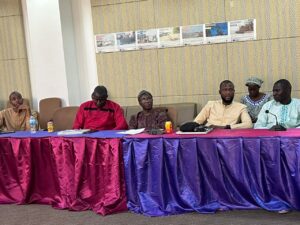
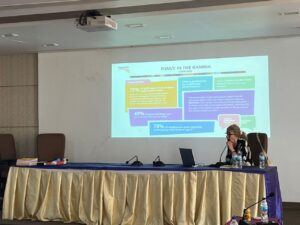
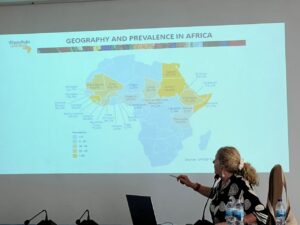


Wassu Gambia Kafo had a meeting, and a presentation with the National Assembly (Lawmakers) on FGM/C in The Gambia and the Law beyond. The main aim of this meeting and presentation done by Professor Adriana Kaplan, is to make sure the lawmakers understand the health implications of FGM/C with Scientific evidence gathered by Wassu Gambia Kafo.
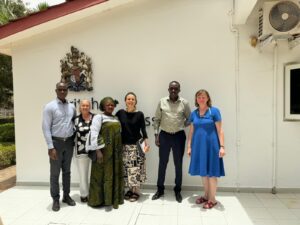
Wassu Gambia Kafo meets with the British High Commission to discuss our work and explore potential partnerships and initiatives.




Wassu Gambia Kafo, GIZ and The Gambia Police Force, had a meeting at the Police Headquarters to discuss a concept for an assessment on Sexual and Gender-Based Violence (SGBV) for Police officers.
Once conducted, the training assessment will enable the consultant to prepare tailor-made training for officers across all regions of The Gambia.
Unicef says repealing FGM law will set dangerous precedence
With the Gambia National Assembly about to vote on a bill to repeal a law banning FGM, more and more powerful voices are joining the call for the law to be maintained.
Nasifa Binte Shafique, the Unicef Country Representative, has said repealing the FGM law will set a dangerous precedent.
Addressing a recent meeting organised by rights group Catch Them Young, Madam Shafique said The Gambia as a nation has to remember her own commitment to protect girls and women who constitute 50% of the population. “Therefore, we firmly call on the government to uphold the obligations under international and national human rights laws and maintain the ban on FGM. As Unicef and other UN agencies, particularly UNFPA, we stand in solidarity with survivors, activists, civil society organisations, faith-based organisations, and all those working tirelessly to end this human rights violation,” she said.
She also appreciated the efforts of the government and CSOs on the strong multilayer advocacies and actions undertaken in the fight to end FGM in this country. “But it is not enough. We should not stop until we prevent the repeal of the law and make sure Gambia becomes FGM-free. That’s a long way to go. But we will get there for sure,” the Unicef official said.
She urged the government to enforce existing laws against child marriage and invest in programs that empower girls to promote gender equality, and provide safe spaces for dialogue.
30/04/2024
Civil Society Organizations (CSO) Dialogue on FGM/C, the law and beyond.

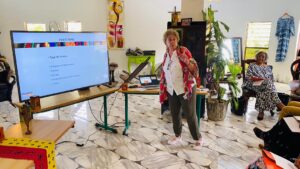


Grand Dialogue has taken place today as part of the common goal of CSOs to bring evidence to the Health and Gender Committee at the National Assembly to avoid the repeal of the Women’s Bill banning FGM/C 2015. Under the auspices of the US Embassy in The Gambia and the presence of other diplomats and donors, Wassu Kafo Gambia’s founder Prof Adriana Kaplan was given the floor to present and engage participants on key research and clinical data on FGM/C health consequences in The Gambia. #EndFGM220
23/04/2024
President Barrow Working to Maintain Ban On FGM
After his meeting with President Adama Barrow at Statehouse recently, Rashad Hussain, US Ambassador-at-large for International Religious Freedom revealed the President said he is working with members of the National Assembly to maintain the ban on Female Genital Mutilation (FGM), and said the president’s position has been very clear on this issue.
However, he said that they recognise the sensitivity of the issue,but said as the issue is being addressed by the Government at the national level, it is critical that they respect the voices of religious leaders. He said they will be talking to members of the National Assembly including those who have brought the legislation forward. He said they are encouraged by the work of civil society and look forward to their cooperation with leaders and organisations to ensure that they maintain a complete total ban on FGM practice.
Ambassador Hussain said he had a productive and straight forward conversation with the president.
“If one looks closely, this practice is banned in so many countries in the world.As a Muslim myself who is engaged with Muslim leaders in the country and around the world, it is clear this is a practice that violates Islamic principles because there are some cases where women and girls are being killed,” he said, adding that they heard from civil society, activists and religious leaders and others who are working passionately towards the rights of women and girls in The Gambia. He said this includes their efforts to work together to maintain the ban on the practice of FGM.
22/04/2024
FGM Cannot Be Considered a Matter Of Choice, says Child Activist.
FGM Cannot Be Considered a Matter Of Choice, says Child Activist.
Tutti Drammeh, a student of St Joseph and a child activist has said
that FGM should not be considered a matter of choice “as harming human beings cannot be a matter of choice.”
She made the remarks at the “Catch Them Young” dialogue on “National Convening on Female Genital Mutilation, Child Marriage and Sexual Violence,” held on Saturday 20th April at the Baobab Hotel.
“Ladies and gentlemen, we also hear people say FM should be a matter of choice, our message to those people is that FGM cannot be considered a matter of choice. Harming human beings cannot be an option, even being their parents does not give anyone the right to harm children”, she argued.
Tutti adds that the state holds a responsibility under all international and local human rights instruments such as CEDAW, UNCRC and The Gambia Women’s Amendment Act to protect girls and women.
“Most of us believe that when the NAMs succeed in repealing this law. They will go after the child marriage law. We cannot afford to get there! This is not the era of regression but progression”, she further stressed.
Ms. Nafisa Binte Shafique the UNICEF Gambia Representative also said: “for several weeks and months now we have all been witnessing attempt and initiatives aimed at repealing the law banning FGM in the Gambia. The proposed repeal of the ban of FGM is a severe violation of human rights and a setback in the global fight against FGM”.
“Repealing this law will set a dangerous precedent and a step back on Gambia’s commitment to protect girls and women”, she added.
She further calls on the government to uphold the obligations under international and national human rights law to maintain the ban on FGM.
Catch Them Young – The Gambia a non-governmental organization dedicated to discovering, nurturing and unleashing the potentials of children, partnered with UNICEF Gambia to convene this dialogue on Saturday 20th April at the Baobab Hotel where different personalities grace the occasion including some National Assembly members
22/04/2024
Counting the Costs: How FGM/C Impedes The Gambia’s Economic Growth
By Chege Ngugi, Africa Regional Director, ChildFund International
Fatou Bensouda – a name that is loved across the world. She is celebrated as the first African woman to serve as Chief Prosecutor of the International Criminal Court (ICC) in The Hague. She is deeply admired, not only in The Gambia, her home country but throughout Africa, serving as a great inspiration. Her achievements remind us of the boundless potential that girls possess when provided with opportunities.
However, I find myself pondering: Would she have reached such heights without access to education? What if she had dropped out of school or succumbed to pressure for early marriage?
I’ve been following the ongoing discourse in The Gambia regarding the government’s ban on Female Genital Mutilation/Cutting (FGM/C). While much of the debate has revolved around the cultural and religious aspects of the practice, it’s crucial to also examine its significant socio-economic impact.
Regardless of one’s position on FGM/C, we all want economic prosperity. We all desire financial stability for our children, families, and the nation. No one enjoys begging or sleeping hungry. Therefore, any initiatives we undertake, as individuals or as a society, should contribute positively to our collective growth and development. Let’s take a moment to reflect on whether FGM/C aligns with this objective, and if it contributes at all.
Firstly, it’s widely acknowledged that FGM/C has a detrimental effect on the educational opportunities of girls and women. UNICEF research indicates that girls who have undergone the procedure are three times more likely to abandon their schooling compared to those who haven’t. This can be attributed to various factors, including the physical and psychological trauma inflicted by the practice, as well as the cultural perception that girls who have undergone FGM/C are more desirable for marriage. What happens to most girls who are uneducated, they cannot secure well-paying jobs or run thriving businesses. A lack of education severely limits girls’ capacity to pursue skilled employment opportunities and achieve financial independence.
According to the World Bank, women lacking formal education earn 50% less than men, while those with only a secondary education earn 75% less.
When girls are educated, they are better equipped to secure higher-paying jobs, contribute to their families’ incomes, and break the cycle of intergenerational poverty. Just like Fatou Bensouda, an educated girl can achieve the unexpected. By denying girls access to education through FGM/C, we are killing the dreams of many more Fatous in the making and in the long run slowing Gambia’s socio-economic development.
Secondly, FGM is associated with high healthcare expenses due to complications arising from the procedure. These complications include severe pain, infections, hemorrhaging, and in extreme cases, fatalities. Moreover, women who have undergone FGM face heightened risks of complications during childbirth, such as obstructed labor and fistula.
We’ve all heard of girls who have suffered from dire health complications after undergoing FGM, not only in The Gambia but across Africa and the world. Most recently, in January, this year, three girls died after undergoing the procedure in neighboring Sierra Leone. How many girls do we want to lose before we can accept that this practice is torture in its rawest form?
Whenever I hear older women who underwent the cut narrating their experience, none describe it as an ‘amazing’ or ‘exciting’ experience that they would love to relive again. Their stories are always laced with pain and horror. How a girl was pinned down by older women, cut, bled and fainted in the process. These stories are always horrific. Should we air these stories on TV and radio all day for people to accept that FGM/C is a dangerous and archaic practice that has no place in the 21st century? Why should we harden our hearts and be blind to the pain of our daughters?
But what troubles me even more is the fact that decisions about a girl’s body are often made by men, whether they be fathers, uncles, husbands, or community leaders. Why is it that women’s bodies are seen as something to be controlled and regulated by men? Why is it that decisions about a girl’s physical integrity are made without her consent, often at a young age when she is not even allowed to speak up for herself? This is not just a Gambian issue; it is a global issue that requires urgent attention and action.
By putting an end to FGM/C, we can mitigate these healthcare expenses and advance improved health outcomes for women and girls. This imperative extends beyond morality; it’s also an economic necessity. According to the World Health Organization (WHO), the annual cost of treating FGM-related complications in just 10 African nations amounts to a staggering $1.4 billion. This financial burden diverts resources that could otherwise be allocated to vital sectors such as education, infrastructure, and housing. Given the many challenges already facing our continent, why should we create more problems? In The Gambia, where healthcare resources are already scarce, the additional strain of FGM-related healthcare costs further burdens an already overstretched system. These funds could be redirected to meet more urgent healthcare needs, such as maternal and child health services or combating infectious diseases.
Cultural practices should never be a justification for the violation of human rights. As stated in the February communique from the UNFPA-UNICEF and partners’ National FGM Conference, this practice violates fundamental human rights, perpetuates gender inequality, and causes immense physical and psychological harm.
The conference further called for collective action to end FGM, outlining commitments such as enforcing laws prohibiting FGM, raising awareness, providing healthcare and support services for survivors, engaging communities, and enhancing cooperation and coordination efforts. This is why at ChildFund, we are committed to working with all players, especially communities, to engage in dialogue and create awareness on the dangers of this practice. We must help people understand that girls are children too, entitled to a life free from violence and discrimination and deserving of the opportunity to reach their full potential.
Civil society organizations, including ChildFund, play a crucial role in raising awareness, providing education, and advocating for policy change. We must stand united, with one voice, in our resolve to keep FGM/C banned, advocating for education and change within communities to replace fear and tradition with understanding and empowerment.
Above all, I appeal to the members of The Gambia’s National Assembly to recognize the gravity of their duty. Your decisions today will be scrutinized by history, you will be judged harshly. Your actions must align with justice and progress. Reversing the ban on FGM/C would signify a regression to a time when the health, rights, and dignity of girls and\ women were disregarded. As lawmakers, you wield the authority to advocate for the rights of all children to exist free from harm. I urge you to cast your votes in defense of our daughters, future mothers and leaders.
Moreover, by ending FGM/C, we send a powerful message to the international community that The Gambia is committed to upholding human rights and promoting gender equality. This can attract investment, promote economic partnerships, and enhance the country’s global reputation as a progressive nation.
We must act now to secure a brighter future for the girls and women of The Gambia. Let’s unite and support efforts to end this harmful practice – once and for all.
18/04/2024
African Child Policy Forum calls for withdrawal of Bill to decriminalize FGM in Gambia
African Child Policy Forum, a child rights policy, advocacy and research centre, is calling on the Gambian government to withdraw a controversial law that decriminalizes female genital mutilation (FGM).
The Bill, which Gambian lawmakers voted to approve for its next parliamentary stage would lift a ban on FGM, which has been in place since 2015. If passed, the Bill would also run counter to the country’s 2022 National Policy for the Elimination of FGM.
The Gambia has signed up to several child rights instruments including the African Charter on the Rights and Welfare of the Child (ACRWC) and the Protocol to the African Charter on Human and Peoples’ Rights on the Rights of Women in Africa (Maputo Protocol). Others are the UN Convention on the Rights of the Child (CRC) and the Convention on the Elimination of all Forms of Discrimination Against Women (CEDAW).
In her remarks on the controversial Bill, Dr. Joan Nyanyuki, Executive Director of the African Child Policy Forum (ACPF) stated, “If the law is repealed, Gambia will become the first country in the world to reverse a ban on FGM. Gambia has come a long way in realizing children’s rights, and efforts made so far to ensure gender equality have been yielding fruits. Decriminalizing FGM will reverse the progress made so far, increase girls’ vulnerability, diminish their agency and put their lives, health and development at risk.”
The 2015 law sets out jail terms of up to three years or a fine of Ksh 91,875 (USD 700) for those who carry out FGM, with the possibility of life imprisonment if the victim dies. Just last year, three Gambian women were convicted of performing FGM on eight girls.
“Taking any regressive measures goes against both the spirit and letter of these instruments. We call on the government of the Republic of Gambia to uphold its obligation to protect girls from harmful social and cultural practices, including FGM, by withdrawing this Bill,” added Dr Nyanyuki.
18/04/2024
Lower Fulladu lawmaker, Gibbi Mballow, who is among few NAMs advocating against the repealing of the anti-FGM law, has met with over 70 imams in his constituency on the Women’s Amendment Bill 2024 which seeks to decriminalise female genital mutilation.
FGM is banned in The Gambia since 2015 with penalties for up to 3 years imprisonment.
Last August, three women from CRR were sentenced to a fine of D15,000 each in default to serve one year in prison after they were found guilty of circumcising children.
Since then, there have been growing calls from conservatives for the law to be removed.
In March 2024, Foñi Kansala lawmaker Almameh Gibba tabled a private bill to repeal the ban. The bill passed the second reading and was referred to a committee for a broader stakeholder consultation.
However, the matter continues to divide opinion among Gambians.
NAM Mballow, who vehemently opposed the repealing of the ban during debate on the second reading of the bill, said the meeting was meant to dialogue with religious leaders in his constituency to understand his reasons for not supporting the repeal, backed by “facts and evidence.”
“I am elected by the people to serve in the National Assembly and this is why I conduct this meeting with you [imams] because this is a religious matter and it is important to hear from you and what you think about the bill,” he informed the imams.
Mballow added that research has shown that FGM is harmful to women and girls with no religious obligation. He cited Senegal and Saudi Arabia as muslim countries that did not legalise FGM. “So why would Gambia be an exception?” MBallow quizzed.
He also warned that the country risks losing huge gains from the international community if it neglects its commitments towards protecting and promoting women and girls’ rights.
The imams were gathered under the auspices of the Committee of Imams of the Mosques for Lower Fulladu West, an umbrella body of imams in the district.
In his contribution, committee adviser and amir, Alhagie Ibra Nyang, argued that FGM is a religious practice accepted by Prophet Muhammad.
He said as imams they understand that the Constitution prevails over sharia in The Gambia and as such, they will not openly defy legal provisions but people who believe in the practice “will do it secretly.”
“I have been teaching for 60 years and the government never paid me. So money will never change what I believe is my religious obligation,” Imam Nyang charged.
Imam Cherno Gassama of Darsilameh, who described the meeting as important, also re-echoed imam Nyang’s position and expressed opposition to criminalisation of FGM.
He argued that the ban was “imposed” by the former regime without the “consent of the majority” of citizens. “This meeting may not be held if the bill was dismissed at the second reading. And the government has never been supportive of imams. We will not change the verses of Allah for small prizes,” he stated.
Yusupha Banja, the imam of Brikamaba, said all scholars in the country have agreed that FGM is a religious act but optional.
Imam Baboucarr Boye of Boiram and Adama Trawally of Tabanding, hailed NAM Mballow for organising the meeting as it shows the importance he attaches to their roles in fostering peace and tolerance.
Imam Boye added that the engagement will also increase their hope and faith in the lawmaker that he stands for representing the wishes and aspirations of his constituents.
The meeting was heated at certain occasions as some of the contributions stirred nerves.
Speaking to The Standard on the sidelines, when asked about his takeaway from the meeting, NAM Mballow said: “My community is already a divided voice but what they generally agree on is that those who want to do it should be allowed to do it and those who do not want to do it should be free but there should be no penalty but I disagree with this, I believe the law should remain and the penalties should be added.”
According to him, there is still a lot of consultations that need to be done to raise awareness about the dangers of FGM to ensure religious and traditional leaders are on the same wavelength with rights advocates.
The program is coordinated and supported by the Women’s Association of Victims’ Empowerment WAVE as part of its Legal Empowerment Fund program. It is meant to raise awareness, foster understanding and identify locally relevant solutions to address the complex issue of FGM.
16/04/2024
https://elpais.com/sociedad/2024-03-18/gambia-da-el-primer-paso-para-despenalizar-la-ablacion-prohibida-desde-2015.html
The Gambia takes the first step to decriminalize excision, banned since 2015
The Gambian Parliament approved this Monday a bill to decriminalize female genital mutilation (FGM), banned in this African country since 2015. Although it still has to go through a final process, it is the first firm step towards a legal change that has in suspense to the country and that, for the people who combat this practice, represents a serious return to the past. Of the 47 deputies who attended the vote, 42 were in favor of repealing the law, four were against and one abstained. “It is a decades-long setback of the much good work that has been done so far. People are disheartened, they feel enormous helplessness,” said Adriana Kaplan, head of the NGO Wassu Gambia Kafo, which has been fighting against FGM for decades.
Once approved in Parliament, the bill now passes into the hands of a commission made up of deputies who will receive recommendations on its content and will undergo a final vote. If this final procedure is passed, and everything points to this after this Monday’s vote, The Gambia would become the first country in the world to prohibit excision and then decriminalize it. The initiative emerged in 2023 from a group of political and religious leaders led by Imam Abdoulie Fatty, a conservative preacher, who launched an aggressive campaign against the ban after three women were jailed for mutilating eight girls aged between four months and a year. year, the first convictions that occurred under the law.
“The Constitution establishes the right to practice religions. If people are arrested for practicing female genital mutilation, that means that they are being deprived of their right to practice religion,” said MP Lamine Ceesay during the parliamentary debate on Monday. “I would rather resign than support a law that will arrest my mothers and fathers for practicing female genital mutilation,” he added. Precisely the campaign launched by Imam Fatty and his followers has insisted on the idea that the excision practiced in The Gambia, which he calls “female circumcision”, is not actually genital mutilation and that it is protected by the Islam.
Fatou Baldeh, a Gambian activist against genital mutilation, expressed through the At the same time, these men continue to trivialize our pain and suffering from FGM.” In his opinion, “what we have seen today has been a manifestation of gender inequality at all levels. Four men have debated among themselves and three fully support repealing the legislation. To end female genital mutilation we must end all discrimination against women, we must have more women parliamentarians.”
For many activists, decriminalization will have a very negative impact in The Gambia and also threatens to create a ripple effect towards other countries. “FGM is going to increase because until now there was a frame of reference, which was the law. Furthermore, the medicalization of the practice will grow. What these religious people say is that circumcisers should be better trained and have better instruments and, if not, that the practice be medicalized to do it in more hygienic conditions. And, unfortunately, it can be an example for other countries,” says Kaplan.
76% of Gambian women mutilated
76% of Gambian women between 15 and 49 years old have suffered female genital mutilation, according to a Unicef report published last year. The law approved in 2015, whose intention is to put an end to this practice that is harmful to women’s health, established penalties of up to three years and a fine of about 773 euros both for those who practice it and for those who “request, incite or promote it by providing tools.” or by any other means”, as well as life imprisonment if said excision leads to death. In addition, it established a fine of about 154 euros for anyone who, having knowledge of the practice of genital mutilation, does not report it.
However, until last year no one had gone to jail under the law. Everything changed in August, when a judge sentenced a circumciser and two mothers for performing excision on eight girls. The fine imposed on each of them was 217 euros or one year in prison. This is where Imam Fatty, known for his homophobia, his defense of excision as part of the Muslim religion, and his collaboration with former Gambian dictator Yahya Jammeh, intervened; He paid the fines to get them out of prison, while encouraging Gambians to continue this practice without hiding. “If everyone agrees to do it openly, the Government cannot imprison an entire people, much less an entire country,” he said then.
18/03/2024
https://www.theguardian.com/global-development/2024/mar/18/move-to-overturn-fgm-ban-in-the-gambia-postponed
Move to overturn FGM ban in the Gambia postponed
A decision on whether to overturn a ban on female genital mutilation (FGM) in the Gambia has been postponed for three months after MPs called for more consultation.
FGM was outlawed in the country eight years ago and is punishable by up to three years’ imprisonment.
Hundreds of people protested outside parliament on Monday, most supporting a repeal of the ban, Agence France-Presse reported.
According to the country’s health survey, three-quarters of women between 15 and 49 have undergone FGM, and anti-FGM campaigners fear the proposed bill is undoing years of work.
Jaha Dukureh, the founder of an anti-FGM group, Safe Hands for Girls, said: “It was the most heartbreaking thing to watch men invalidate our experiences and reduce our pain to western influence.
“The bill was sent to committee. This can be good and it can be bad. The good thing that came out of today is that FGM is still illegal in the Gambia. Sending the bill to committee means that we have a little more time but that means that in 2024 we are still debating cutting off the genitals of girls in my home country.”
The bill’s referral to a parliamentary committee means it will be examined for at least three months before returning to parliament for debate and a vote.
Introducing the bill to parliament, the MP Almameh Gibba said overturning the ban would “uphold religious loyalty and safeguard cultural norms and values”. Opponents of the ban have often framed it as contrary to Islamic rules, while anti-FGM campaigners say the practice does not have any basis in the Qur’an.
Speaking before Monday’s decision, Janet Ramatoulie Sallah-Njie, the special rapporteur on the rights of women in Africa for the African Commission on Human and Peoples’ Rights, said she was concerned that if the FGM law was scrapped, laws around early and forced marriage could follow.
“We have to hope that civil society is fully galvanised and vigorously advocating,” said Sallah-Njie, who is from the Gambia.
18/03/2024
Gambia Moves Toward Overturning Landmark Ban on Female Genital Cutting
Lawmakers in the West African country voted to advance a bill repealing a 2015 ban. If it passes the final round of voting, Gambia will become the first nation to roll back protections against the practice.
Gambian lawmakers have voted to advance a measure revoking a ban on female genital cutting by removing legal protections for millions of girls, raising fears that other countries could follow suit.
Of the 47 members of the Gambia National Assembly present on Monday, 42 voted to send a bill to overturn the ban onward to a committee for consideration before a final vote. Human rights experts, lawyers and women’s and girls’ rights campaigners say that overturning the ban would undo decades of work to end female genital cutting, a centuries-old ritual tied up in ideas of sexual purity, obedience and control.
If the bill passes the final stages, the small West African nation of Gambia will become the first nation globally to roll back protections against cutting.
Government committees will be able to propose amendments before it comes back to Parliament for a final reading in about three months — but analysts say that it has now passed the key stage: Its proponents will gain momentum and it will probably become law.
Gambia banned cutting in 2015 but did not enforce the ban until last year, when three practitioners were given hefty fines. An influential imam in the Muslim-majority country took up the cause and has been leading calls to repeal the ban, claiming that cutting — which in Gambia usually involves removing the clitoris and labia minora of girls between the ages of 10 and 15 — is a religious obligation and important culturally.
Anti-cutting campaigners gathered outside Parliament in Banjul, Gambia’s capital, on Monday morning, but police set up barricades and prevented many from getting inside — while allowing in the religious leaders who advocate cutting and their supporters, according to Fatou Baldeh, one of Gambia’s leading opponents of genital cutting.
“It was very sad to witness the whole debate, and men trying to justify why this would continue,” Ms. Baldeh said after the vote. She said she feared that if the men leading the charge — whom she described as extremists — succeeded, they would next try to roll back other laws, like one banning child marriage.
Inside Parliament, lawmakers — all of them men — traded arguments.
“If people are being arrested for practicing F.G.M., then that means they are being deprived of their right to practice religion,” one member of parliament, Lamin Ceesay, said, according to Parliament Watch, a project that promotes parliamentary transparency and accountability.
“Let’s protect our women,” another, Gibbi Mballow, said. “I am a father, and I can’t support such a bill.” He added, “Religion says we should not harm women.”
Image

Cutting takes different forms and is most common in Africa, though it is also widespread in parts of Asia and the Middle East. Internationally recognized as a gross violation of human rights, it frequently leads to serious health issues, like infections, hemorrhages and severe pain, and it is a leading cause of death in the countries where it is practiced.
Worldwide, genital cutting is increasing despite campaigns to stop it — mainly because of population growth in the countries where it is common. More than 230 million women and girls have undergone it, according to UNICEF — an increase of 30 million people since the last time the agency made an estimate, in 2016.
Four lawmakers voted against advancing the bill and one abstained on Monday. Only five of Gambia’s 58 lawmakers are women, meaning men are spearheading a discussion on a practice that is forced on young girls.
“They have no say,” said Emmanuel Joof, head of Gambia’s National Human Rights Commission.
Repealing the ban will pose “serious, life-threatening consequences for the health and well-being of Gambia’s women and girls,” said Geeta Rao Gupta, the U.S. ambassador at large for global women’s issues.
From 1994 until 2016, Gambia was led by one of the region’s most notorious dictators, Yahya Jammeh, who, a truth commission found in 2021, had people tortured and killed by a hit squad, raped women and threw many people in jail for no reason. He called those fighting to end female genital mutilation, often known by its acronym, F.G.M., “enemies of Islam.”
Image

So it came as a shock to many Gambian opponents of cutting when, in 2015, Mr. Jammeh banned the practice — something many observers attributed to the influence of his Moroccan wife.
The new law was hailed as a watershed moment in Gambia, where three-quarters of women and girls are cut. But the law was not enforced, and this emboldened pro-cutting imams who are “hellbent on having a theocratic state” to try to repeal it, according to Mr. Joof.
Clerics in the Muslim world disagree on whether cutting is Islamic, but it is not in the Quran. The most vocal of the Gambian imams, Abdoulie Fatty, has argued that “circumcision makes you cleaner” and has said the husbands of women who have not been cut suffer because they cannot meet their wives’ sexual appetites. Many Gambians accused Mr. Fatty of being a hypocrite, pointing out that when Mr. Jammeh banned cutting, Mr. Fatty was the presidential imam but apparently said nothing.
At the bill’s first reading two weeks ago, Mr. Fatty bused in a group of young women to chant pro-cutting slogans outside Parliament. Their faces veiled — which is unusual in Gambia — they sang and waved pink posters that read: “Female circumcision is our religious beliefs.”
Ms. Baldeh, the opponent of genital cutting, was 8 years old when she was pinned down and cut. But when she first heard the term “female genital mutilation,” when she was studying for a master’s degree in sexual and reproductive health, she didn’t recognize it as something she had been through, because she saw it as part of her culture, not something violent that harmed women. Her own grandmother, a traditional birth attendant, was involved in cutting.
After reading and speaking to other women, though, Ms. Baldeh realized what she had been subjected to and started speaking out against cutting — first by trying to change her own family members’ minds. She became one of the most prominent voices speaking out against cutting in Gambia.
Cutting could be ended within a generation, if there were the will to do it, Ms. Baldeh said.
“If you don’t cut a girl, she’s not going to cut her future daughters,” she said.
On March 4, Ms. Baldeh was at the White House with Secretary of State Antony J. Blinken and Jill Biden, the first lady, receiving an International Women of Courage award for her work against cutting. But that same day Gambian lawmakers were listening to the first reading of the bill to overturn the cutting ban — one that would unravel the legal gains Ms. Baldeh and other opponents of cutting had made.
Image

She and other observers said that most Gambian lawmakers did not necessarily believe in cutting but were in favor of the bill because they were afraid of losing their parliamentary seats.
“The saddest part is the silence from the government,” she said.
This silence extends even to the ministry charged with protecting women and children, which is headed by Fatou Kinteh, who previously was the United Nations Population Fund’s coordinator in Gambia for gender-based violence and female genital mutilation. Reached by phone on Saturday, Ms. Kinteh refused to comment on a possible overturn of the cutting ban, saying she would call back later. She never did.
Ms. Baldeh said the imams’ recent rhetoric in support of cutting had spread to many Gambian men, who have unleashed a torrent of online abuse on women who speak out against the practice, undermining what had been a flourishing movement to increase women’s and girls’ rights in Gambia. But she said the online abuse would not derail their efforts.
“If this law gets repealed, we know they’re coming for more,” Ms. Baldeh said. “So we will fight it to the end.”
18/03/2024
El Colegio de Abogados de Gambia (GBA) pide al Inspector General de la Policía (IGP) que advierta a quienes consideren violar la ley contra la Mutilación Genital Femenina.
GBA tells IGP to warn those considering to violate anti-FGM law

2023
| 06/febrero/2023 | Hecho a medida – La lucha contra la Mutilación Genital FemeninaEn 2012 las Naciones Unidas designaron el 6 de febrero como el Día Internacional de Tolerancia Cero por la Mutilación Genital Femenina. Según datos de la organización, se calcula que más de 200 millones de mujeres y niñas en el mundo le han sufrido y que cada 4 millones de mujeres y niñas están en riesgo de sufrirla. Para hablar de ello nos acompaña la antropóloga y directora de la ONG Wassu Gambia Kafo, Adriana Kaplan, una entidad que trabaja el empoderamiento de las personas para que tomen decisiones informadas para la prevención de la Mutilación Genital.(La Xarxa) |
| 20/septiembre/2023 | “Un retroceso de 30 años” en Gambia: líderes religiosos y políticos quieren despenalizar la mutilación genital femenina
La condena a tres mujeres por practicar ablaciones a ocho bebés genera un intenso debate en el país africano, donde la práctica está prohibida desde 2015 pero el 75% de las adolescentes ha sido sometida a esta práctica. (El País) |
2022
|
2019
| 21/noviembre/2019 | Wassu-UAB considera un “fracaso” del protocolo recurrir a los Mossos en casos de ablación de clítoris
La Fundación pide más formación, sobre todo en los Centros de Atención Primaria, para que los profesionales aborden el fenómeno con las familias. (Afrontar) |
| 21/noviembre/2019 | Un estudio muestra deficiencias en la aplicación del protocolo catalán contra la MGF
La Fundación Wassu UAB da a conocer las principales conclusiones del trabajo “Mutilación genital femenina (MGF). Informe de evaluación del modelo de actuación de la Generalidad de Cataluña (2002-2018)”. (Universitat Autònoma de Barcelona) |
| 21/noviembre/2019 | Suspenen la aplicación del protocolo catalán contra la mutilación genital femenina
Un estudio de la Fundación Wassu-UAB detecta un exceso de medidas punitivas y carencias de formación. (Ara gato) |
| 21/noviembre/2019 | La Fundació Wassu-UAB exige más formación para no tener que recordar a los Mossos en posibles casos de ablación del clítoris
(La República) |
| 22/noviembre/2019 | Un estudio de la Fundació Wassu UAB mostró deficiencias en la aplicación del protocolo catalán contra la Mutilación Genital Femenina
(Lo Campus Diario) |
| 22/noviembre/2019 | Alertan de fallos en el protocolo contra la ablación en Catalunya
Un estudio de la Fundació Wassu UAB ve “deficiencias” en la aplicación del protocolo catalán contra la mutilación genital femenina (MGF) y critica que la Generalitat no ha apostado por la formación en profesionales de Atención Primaria ni ha trabajado en favor del empoderamiento real de la población afectada por la práctica. ( Prensa Cataluña Inglesa) |
2018
| 02/febrero/2018 | 4.500 mujeres, en riesgo de sufrir mutilación genital
Un total de 4.500 mujeres podrían haber sufrido o están en riesgo de sufrir la mutilación genital femenina en Canarias. Son las estimaciones de la Fundación Wassu de la Universidad Autónoma de Barcelona en función del país de procedencia donde ese tipo de prácticas es extensiva, como el caso de Mali con el 89% o Guinea Conakry con el 96%. (Cadena Ser) |
| 02/febrero/2018 | Fundación de la UAB organiza en Gambia un foro de mutilación genital femenina
La Fundación Wassu de la Universidad Autónoma de Barcelona (UAB) organiza en Gambia el II Foro Internacional sobre Mutilación Genital Femenina (MGF), según informa hoy el centro universitario. (La Vanguardia) |
| 03/febrero/2018 | La Rey Juan Carlos forma a 6.000 estudiantes contra la mutilación genital femenina
El periódico El País recoge parte de los resultados obtenidos por el Programa Académico Multisectorial de Prevención y Lucha contra la Mutilación Genital Femenina (MAP-FGM), proyecto cofinanciado por la Comisión Europea, liderado por el Observatorio de Igualdad de Género de la URJC y en la Fundación Wassu participó junto con la Vrije Universiteit de Bruselas, la Universidad Roma Tre y el ISCTE-IUL de Portugal. (El País) |
| 05/febrero/2018 | Más de 18.000 niñas que viven en España corren el peligro de sufrir la ablación
En España viven unas 69.000 mujeres procedentes de países donde se practica la Mutilación Genital Femenina (MGF) y de todas ellas unas 18.000 hijos niñas menores de 14 años, según un estudio realizado por la Fundación Wassu de la Universidad Autónoma de Barcelona. (El Periódico) |
| 05/febrero/2018 | PSOE pide medidas de protección para las 18.396 niñas de países donde se practica la mutilación que viven en España
El PSOE ha reclamado este lunes, víspera del Día Internacional de Tolerancia Cero contra la Mutilación Geninal Femenina (MGF), que se pongan en marcha de medidas de sensibilización y protección para las 18.396 niñas provenientes de países donde aún persiste esta práctica y que viven en España. . (EuropaPrensa) |
| 06/febrero/2018 | “Por qué la mutilación genital femenina en España no desaparecerá con solo prohibirla”
“En los últimos años la legislación ha reflejado lo injusto y horrible que es arrancarle a una mujer una parte de su cuerpo sin ningún beneficio médico. Además de ser ilegal tanto en España como a nivel europeo y gracias a la evidencia científica y el trabajo de campo de Wassu-UAB se promovió su prohibición en Gambia en 2015. (Código Nuevo) |
| 07/febrero/2018 |
|
| 09/abril/2018 | Las mujeres que lograron el cambio.
La Dra. Adriana Kaplan, directora de Fundación Wassu, visitó durante marzo la provincia de Santa Fe, Argentina, donde participó de una charla organizada por el Banco Credicoop. En aquella ocasión, la periodista Valeria Elías, de Mirador Provincial, conversó con ella acerca de la práctica de la mutilación genital femenina, la investigación que lleva a cabo, su trayectoria y las reivindicaciones de género por las que luchan las mujeres en diferentes culturas. (Mirador Provincial) |
| 24/abril/2018 | Érase una vez África…”
La periodista de El Mundo, Núria Ribó, dibujó una imagen de Gambia en la que se mezclan sus propias impresiones del viaje que realizó, con la experiencia de la directora de Fundación Wassu, Dra. Adriana Kaplan, que lleva más de 30 años investigando y trabajando en el país. (El Mundo) |
| – | Los defensores dicen que la cultura del silencio sobre las implicaciones de la MGF para la salud debe romperse
Los defensores de las mujeres y las niñas en contra de la mutilación y ablación genital femenina (MGF), práctica tradicional de varias décadas, exigen que se ponga fin a la cultura de silencio en las comunidades sobre las implicaciones para la salud de la práctica, diciendo que “la cultura del silencio debe estar roto, ahora”. (Ojoáfrica) |
| – | La prohibición de MGF es una de las principales conquistas del Gobierno de Gambia”
La prohibición del gobierno de Gambia sobre la práctica de mutilación y ablación genital femenina (MGF) anunciada por el ex presidente Yahya Jammeh en diciembre de 2015 ha sido catalogada como una de las mayores conquistas del país por la Prof. Adriana Kaplan, directora de Wassu Gambia Kafo. (Ojoáfrica) |
2017
| 27/enero/2017 | Adriana Kaplan entrevistada en el diario de las Palmas “la Provincia”
El diario de las Palmas “la Provincia” entrevista a Adriana Kaplan para informar sobre la Mutilación Genital Femenina y el trabajo que la antropóloga realiza entre Gambia y España. La Dra. Kaplan expone la metodología desarrollada por Fundación Wassu y el nuevo contexto legal que prohíbe la realización de la práctica en Gambia. Por otro lado, y en relación al papel que la comunidad internacional tiene en la prevención de prácticas perjudiciales como la MGF, remarca que “el camino es la educación”. (La Provincia) |
| 04/febrero/2017 | “La ley no es suficiente para erradicar la mutilación genital femenina”
En el marco del congreso internacional organizado por Fundación Wassu y el Observatorio de Igualdad de Género de la Universidad Rey Juan Carlos, Adriana Kaplan (directora de la Fundación Wassu) y Kemo Fatty (formador en la ONG Wassu Gambia Kafo) hablan para el País del contexto en Gambia y de la importancia de realizar un trabajo de prevención para promover la iniciación sin mutilación. (El País) |
| 23/octubre/2017 | “Erradicar la mutilación genital femenina”
El medio catalán VilaWeb se adentra en el tema de la mutilación genital femenina (MGF) y su erradicación, a través de un recorrido por el trabajo de la Fundación Wassu tanto en África como España. Xavier Montanyà, autor de la noticia, abre el texto con el siguiente dato: “la MGF amenaza a tres millones de niñas cada año en el mundo”. La cifra desafía a la comunidad internacional completa, ya que las niñas en riesgo no sólo se encuentran en los países africanos y asiáticos donde se realiza tradicionalmente la práctica, sino que las migraciones han trasladado la MGF también a Europa. (VilaWeb) |
2016
| 05/febrero/2016 | El País: Gambia aprueba su primera ley contra la ablación
El País informa de la nueva legislación contra la Mutilación Genital Femenina en Gambia enfatizando cómo “el trabajo de campo hecho por la Fundación Wassu-UAB desde 2008” ha dado evidencia científica de las consecuencias negativas que la MGF tiene para la salud, resultando ser el “germen de todo este proceso” que de momento ha culminando con el surgimiento de la nueva ley en Gambia. (El País) |
| 06/febrero/2016 | TV3 presenta la Mutilación Genital Femenina en motivo del Día Internacional contra la práctica
Debido a la aprobación de una nueva ley contra la Mutilación Genital Femenina en Gambia y en motivo del Día Internacional contra la práctica, TV3 reconoce el trabajo realizado por la Fundación Wassu-UAB en Gambia. (TV3) |
| 06/febrero/2016 | Adriana Kaplan entrevistada en el programa “Un Món Posible” de RTVE
Adriana Kaplan explica en Radio Televisión Española los tipos, ubicación y razones culturales de la Mutilación Genital Femenina, y expone la importancia de la circularidad de los procesos migratorios, así como la metodología y objetivos de la Fundación Wassu-UAB en España y de la ONG Wassu Gambia Kafo en Gambia. (RTVE) |
2015
| 12/ene/2015 | Aprobación del Protocolo Común de Actuación Sanitaria frente a la Mutilación Genital Femenina. Con la intervención de Aina Mangas, investigadora de la Fundación Wassu-UAB
El Ministerio de Sanidad, junto con las comunidades autónomas, ha aprobado un Protocolo Común de Actuación Sanitaria frente a la Mutilación Genital Femenina. Aina Mangas, investigadora de la Fundación Wassu-UAB, interviene enfatizando la importancia de la formación de los/as profesionales de la salud en materia de prevención. (El País) |
| 06/febrero/2015 | Adriana Kaplan, directora de la Fundación Wassu-UAB, en el Día Internacional de Tolerancia Cero con la MGF: «me preocupa la perversidad de las políticas contra la ablación»
El 6 de febrero de 2015, con motivo del Día Internacional de Tolerancia Cero con la Mutilación Genital Femenina (MGF), Adriana Kaplan habla para El País. Junto con el equipo de investigación que dirige en la Fundación Wassu-UAB, ha conseguido levantar el veto sobre la mutilación genital femenina en Gambia. A través del Observatorio Transnacional de Investigación Aplicada a la prevención de la MGF, la organización científica trabaja, desde hace 27 años, a dos bandas entre España y Gambia para la prevención de la práctica. (El País) |
| – | Formaciones de WGK a profesionales sanitarios, en colaboración con la Unidad de Reproducción e Infancia, Ministerio de Salud y Bienestar Social, Gambia
En colaboración con la Unidad de Reproducción e Infancia (RCH), dependiente del Ministerio de Salud y Bienestar Social de Gambia, WGK llevó a cabo cinco formaciones en diferentes regiones del país, durante el mes de enero de 2015. Estas actividades se implementaron de acuerdo al vigente Programa Nacional de Formaciones a Profesionales Sanitarios en materia de MGF, firmado entre el Ministerio de Salud de Gambia y WGK. |


